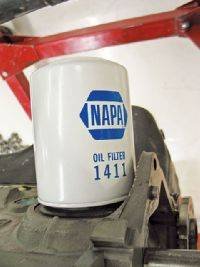I'm running Mobil 1 10w40 with the standard Purolator Classic filter in my Fury 440 HP. I don’t drive it much and have actually started teardown for a proper restoration but I was changing it in the spring and fall because I never put 3K miles on it in a year.
I run Mobil 1 5w40 with the standard Purolator Classic filter in both my wife's Avenger and Charger, both 3.5L H.O. I also put a quart of Slick 50 in at 50K mile intervals starting at 6K after break in. I change the oil every 3K miles.
I run Amzoil 15w40 with a Mopar filter in my Ram 6.7 Diesel. I change it every 6K miles.
I used to run Fram filters but there's been so much bad PR about the construction of the Fram filters over the past couple years that I started researching it and decided to switch. Not that I was really worried about it but it became obvious that they were cutting as many corners as they could so screw um, I’m not buying their junk.
I then switched to Purolator Pure and started researching it. One article I read, talked about the potential for increased oil pressure with any ultra high micron, premium filter which theoretically could cause issues. I found that of the basic filters, the Purolator Classic is constructed well, at least when I did my research, and readily available at most parts stores so that’s why I use it.
As DetMatt said, the most important thing is to keep the oil changed at regular intervals and the filter really isn’t going to matter much. Oh, and I know I change my oil sooner than the recommended oil change for all my vehicles but if you consider the function of the oil, it can only help.
My two previous vehicles, 1996 Dodge Intrepid 3.3L, sold with 160K miles, didn’t burn oil, no noticeable power loss from new and still got the same gas mileage as new which was better than either the Charger or the Avenger. 1998 Dodge Ram 1500 4x4 5.9L Gas, sold with 200K miles, didn’t burn oil, no noticeable power loss from new and still got the same gas mileage as new. I used Fram filters, Mobil 1 and Slick 50 every 50K miles. Sold the Intrepid because it sat more than it was driven after my wife got the Avenger and I sold my truck because the bed and driver door were rotting and I didn’t want to replace body panels on a daily driver gas engine truck with 200K miles.
Before my 1998 Ram, I had a 1988 Chevy S10, same oil change regiment and my old mechanic for inspection and things I didn’t have time for bought it from me in 1998 when I bought my Ram. In 2012, I was talking to them and it had been relegated to farm duty because of the rusted body but it was still running.
Hindsight, for what I sold the Intrepid and 98 Ram for, I wish I would have kept them both but that’s just me. No such thing as too much land, too many cars, or too many guns.

















